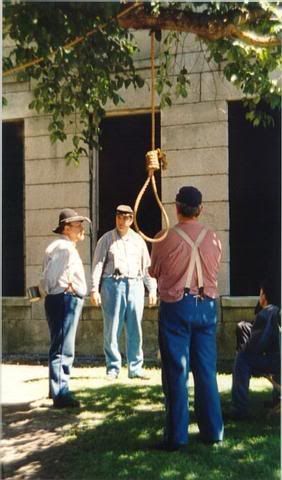
In an e-mail, Gabriel Rey-Goodlatte of ColorofChange.Org says,
"Richard Cohen (of the SPLC [Southern Poverty Law Center]) and John Tye (civil rights attorney) have a piece deconstructing Reed Walters' recent op-ed in the New York Times, focusing in on his double standard prosecutorial discretion. (I think it touches on a lot of what dnA wrote about it response to the same piece).
It would be great if this got some attention -- it's unfortunate that Reed Walters was given a forum by the New York Times for several outright distortions about the case in Jena (as this piece shows). Richard Cohen and John Tye are very credible voices on this.
Gabriel"
I agree that this is crucial information, so here's the Southern Poverty Law Center article in its entirety:
The Stroke of a Pen
Double Standard in Jena
By Richard Cohen and John Tye
To Reed Walters, the prosecutor in the Jena Six case, his job is a simple one. As he explained in a recent New York Times op-ed piece , "For 16 years, it has been my job as the district attorney to review each criminal case brought to me by the police department or the sheriff, match the facts to any applicable laws and seek justice for those who have been harmed." Just the facts, ma'am.
But Walters ignores the tremendous latitude prosecutors have to raise, lower, or dismiss charges as they see fit, under the doctrine of prosecutorial discretion. The injustice in Jena is not that any criminal charges were brought in the assault on Justin Barker. Rather, the injustice is that black perpetrators in Jena receive a completely different brand of prosecutorial discretion than white perpetrators.
Let's start with the white students who hung nooses from the so-called "white" tree after black students sat under it.
Walters states that the United States attorney "found no federal law against what was done." In actuality, the federal prosecutor told CNN that "the FBI believed that [the case had] the elements of a hate crime ." But because of the boys' ages and backgrounds, he declined to bring charges that could have put them away for 10 years. This is prosecutorial discretion in action.
Walters also had discretion to prosecute the noose-hangers in state court. He claims that the noose incident "broke no law. I searched the Louisiana criminal code for a crime that I could prosecute. There is none." But, it just ain't so.
Louisiana Revised Statute 14:107.2 creates a hate crime for any institutional vandalism or criminal trespass motivated by race. Walters was creative enough to turn a schoolyard assault into an attempted murder case; he surely could have figured out how to make nooses into hate crimes.
But -- and this is a crucial point -- Walters and the Justice Department were right not to prosecute the noose-hangers. Prison terms for them would not have served Jena as well as a thoughtful, measured response that addressed the deep community concerns triggered by the nooses.
Unfortunately, that never happened. Instead, Walters and the school system tried to stifle debate. Black parents were ignored at school board meetings. After black students staged a sit-in under the contested tree, Walters came to the school and, according to numerous witnesses, ominously told the student body that if they did not settle down, "I can end your life with the stroke of my pen."
Reed Walters knows prosecutorial discretion.
Things did settle down somewhat, until an arsonist burned down much of Jena High on November 30, 2006. What happened the next day perfectly illustrates the racial disparity in Walters' decision-making.
On December 1, a black student, Robert Bailey, was attacked by a group of whites, beaten to the ground, and apparently hit with a beer bottle. He suffered a gash to his head.
Walters could have prosecuted the group of whites with felony charges that might have put them away for years, just as he is now prosecuting the Jena Six. Instead, Walters charged one white with a misdemeanor; that person served no prison time. The others walked.
Three days later, the assault on Barker occurred. Bailey and five other black teens were arrested and charged by the police with aggravated second-degree battery, a very harsh charge under the circumstances. But Walters, in an apparent effort to show what he could do with a stroke of his pen, went even further and used his discretion to increase the charges to attempted murder.
Since then, Walters' decisions have continued to raise serious questions. In April, the Supreme Court of Louisiana removed him from an unrelated case -- an unusual and drastic step -- after Walters told the defendant that he was "in the cross hairs," not because of the severity of the alleged crime, but because the defendant had spread rumors about Walters.
In the Jena Six cases, Walters decided to prosecute 16-year-old Mychal Bell in adult court even after dropping the ill-conceived attempted murder charges. An appeals court later ruled that Walters' decision was improper. He's still pursuing aggravated assault charges on the theory that the boys' tennis shoes were dangerous weapons.
Justice should be blind. But prosecutors are not. They see color. And, unfortunately, it often has an impact on how they exercise their prosecutorial discretion. In Reed Walters' case, it's as clear as black and white.
Richard Cohen is president of the Southern Poverty Law Center. John Tye is a civil rights attorney in New Orleans.


No comments:
Post a Comment